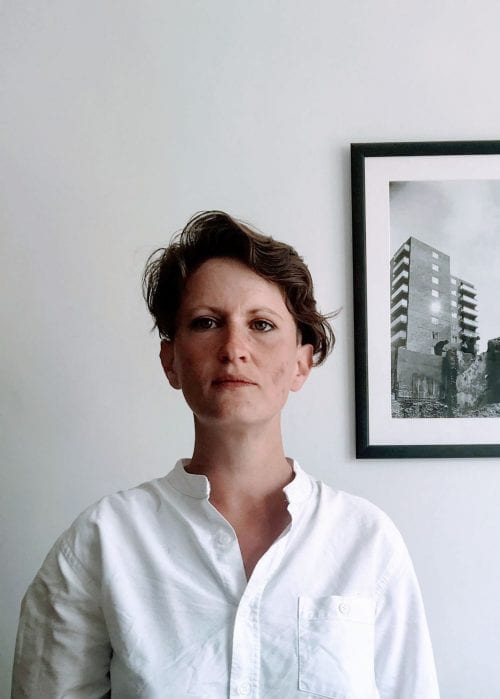Dr Becca Searle and Dr Heba Youssef teach on our new politics degrees – here we find out a bit more about what made them want to specialise in this fascinating subject and how they teach politics at Brighton.
Hi Heba, hi Becca
What made you choose to research and teach politics? And what makes researching and teaching this subject at Brighton special?
Becca: “The idea for developing a course in Politics and Social Change came out of my work setting up the University of Brighton’s Housing Forum, which aims to find out how the university can best support local efforts to tackle the housing crisis in the city.
“It made me realise that as academics and students we can make a real difference in our communities. Most traditional degrees, however, don’t really equip us with the skills we need to do this. The idea of the Politics and Social Change degree is to provide students both with an understanding of the political world and a range of creative and digital skills, and real world experiences so that graduates are equipped to contribute to solutions to the many global challenges we face today.”
Heba: “I am fascinated by international relations and global politics and how it directly impacts people’s lives in ways that may not be immediately apparent to some. I am particularly interested in the formative effects of slavery and colonialism on international relations and contemporary global politics, especially the erasures and silences that surround inequality, power differentials in the current global order.
“Our decolonised Politics and International Relations degree offers students a fresh perspective that will revolutionise how they see the world and their place in it. It will also be a space where issues surrounding social justice, race and colonialism are brought to the fore of political debates.”
How would you describe Brighton, an what’s your favourite thing about it?
Becca: “I first got to know Brighton when I was a teenager and worked in my Dad’s ice cream shop on the seafront. As a queer teenager, who lived in a small village, Brighton was a place where I felt safe and could meet and get to know other people like me. As a student in the city, I got to know a different side to the city.
“With two universities in the city, Brighton is crammed full of people who want to discuss ideas and politics. Brighton has a great political scene, and whatever your political leanings you can find like minded groups and organisations. As I get older, I appreciate different things about the city. Brighton is nestled between the sea and some of the most beautiful countryside in the country. These days you are far more likely to find me roaming the downs or on my allotment than in the bars and clubs!“
Heba: “Brighton is an amazing city by the sea! It offers different things and you can find something to satisfy your interests, whatever these maybe. There are plenty of part-time employment opportunities in Brighton in the plethora of cafes, restaurants, and pubs that pepper out city, as well as the small start-ups and organisations based here.
“Our students balance their studies and their jobs beautifully and some of them do research on their workplaces. The work experiences they find in Brighton have inspired many of my students’ academic research as well as long-term interests and activism.”
What support can the university offer students, in terms of accessing support when it’s needed?
Becca: “I’ve worked at several different universities, and the University of Brighton always stood out as a place that really prioritises the educational experience of students. Rather than just doing things the way they always have been done, staff think seriously about different forms of teaching and learning that best support new generations of students.”
Heba: “Staff at Brighton are approachable, friendly, and supportive. Every student is assigned a personal tutor at the outset from the academics on their course/school. Students are offered guidance and support on different aspects of their assignments and degrees. There are regular individual meetings between a student and their tutor, especially before they submit assignments in order to receive feedback on their plans.”
What should a student think about when deciding which politics course to study?
Becca and Heba: “The politics degrees at the University of Brighton provide an understanding of the most urgent global challenges we face today, as well as the skills you need to change the world. They also prepare students for graduate employment opportunities in politics, think tanks, journalism, government, teaching, and academia.
“In addition to academic skills, there are opportunities to learn a range of digital and creative skills, including filmmaking, podcasts and journalism. You will work with organisations outside the university, with options to gain experience working for a non-profit organisation, to respond to briefs provided by community organisations and national campaign groups and run a political campaign. Unlike education at school or college, where you have to learn a national curriculum, on the politics degrees there are plenty of opportunities for you to take options in order to shape and determine your own education.
“In the Global Challenges Lab, students work in groups to design and conduct their own research projects. In Activism and Social Change, students will work together to run their own political campaign on behalf of a community organisation. There are options to choose modules from across the Humanities and Social Sciences, allowing students to really tailor their studies to their interests.”
Find out more about studying politics at Brighton on the politics subject page.


Published by